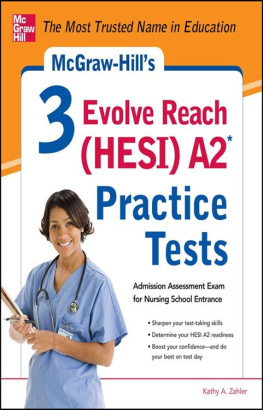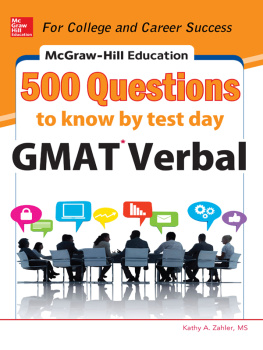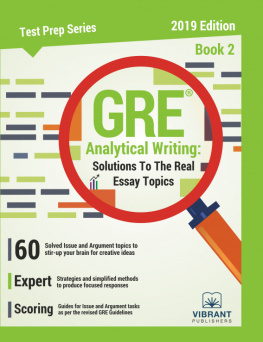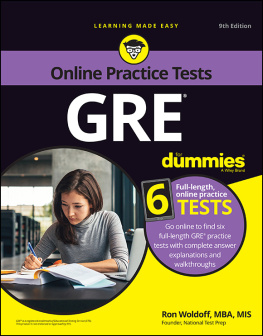Kathy A. zahler - Conquering GRE Verbal Reasoning and Analytical Writing
Here you can read online Kathy A. zahler - Conquering GRE Verbal Reasoning and Analytical Writing full text of the book (entire story) in english for free. Download pdf and epub, get meaning, cover and reviews about this ebook. year: 2020, publisher: McGraw-Hill Education, genre: Children. Description of the work, (preface) as well as reviews are available. Best literature library LitArk.com created for fans of good reading and offers a wide selection of genres:
Romance novel
Science fiction
Adventure
Detective
Science
History
Home and family
Prose
Art
Politics
Computer
Non-fiction
Religion
Business
Children
Humor
Choose a favorite category and find really read worthwhile books. Enjoy immersion in the world of imagination, feel the emotions of the characters or learn something new for yourself, make an fascinating discovery.

- Book:Conquering GRE Verbal Reasoning and Analytical Writing
- Author:
- Publisher:McGraw-Hill Education
- Genre:
- Year:2020
- Rating:4 / 5
- Favourites:Add to favourites
- Your mark:
- 80
- 1
- 2
- 3
- 4
- 5
Conquering GRE Verbal Reasoning and Analytical Writing: summary, description and annotation
We offer to read an annotation, description, summary or preface (depends on what the author of the book "Conquering GRE Verbal Reasoning and Analytical Writing" wrote himself). If you haven't found the necessary information about the book — write in the comments, we will try to find it.
Conquering GRE Verbal Reasoning and Analytical Writing — read online for free the complete book (whole text) full work
Below is the text of the book, divided by pages. System saving the place of the last page read, allows you to conveniently read the book "Conquering GRE Verbal Reasoning and Analytical Writing" online for free, without having to search again every time where you left off. Put a bookmark, and you can go to the page where you finished reading at any time.
Font size:
Interval:
Bookmark:
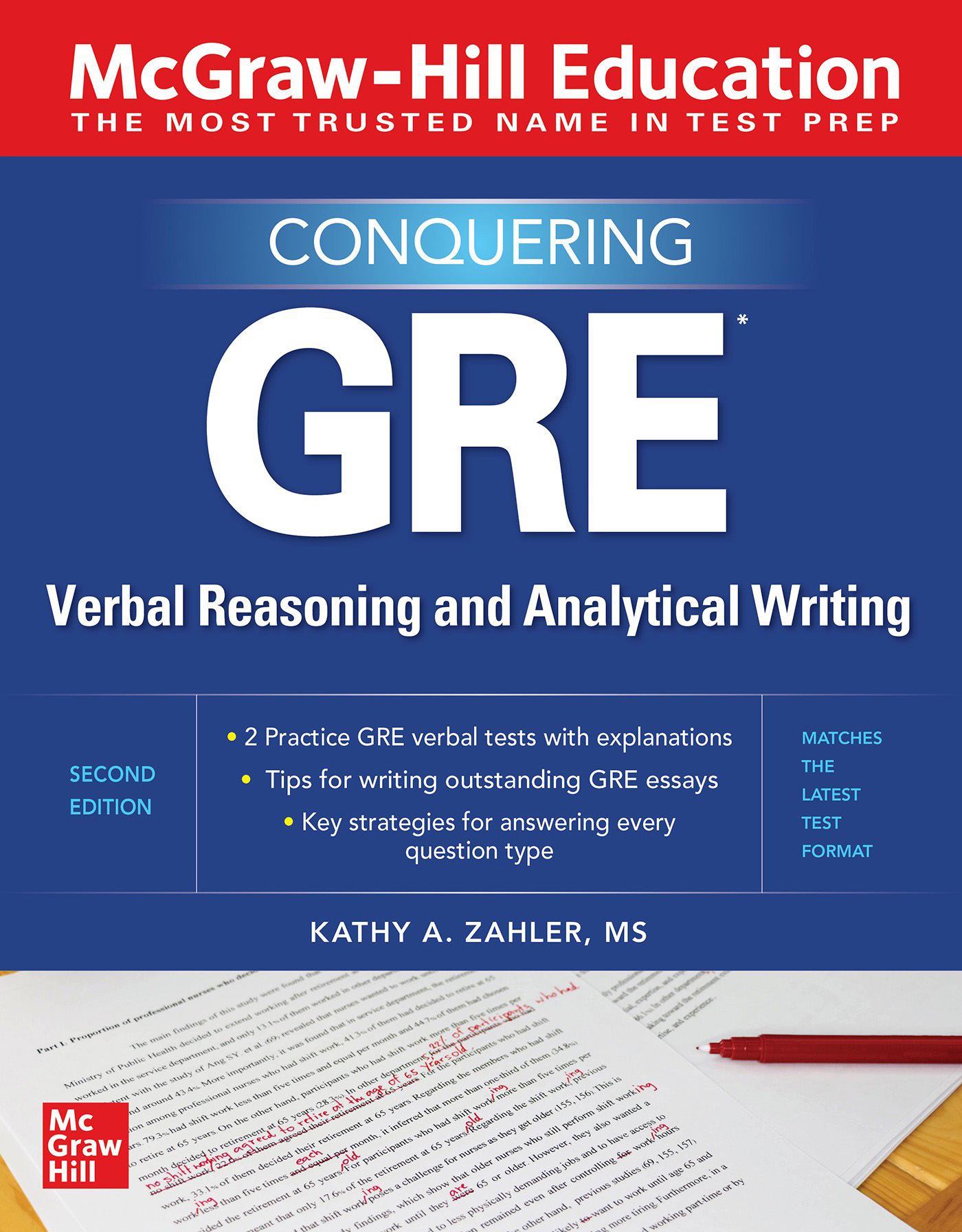

Copyright 2020, 2011 by McGraw-Hill. All rights reserved. Except as permitted under the United States Copyright Act of 1976, no part of this publication may be reproduced or distributed in any form or by any means, or stored in a database or retrieval system, without the prior written permission of the publisher.
ISBN: 978-1-26-046254-8
MHID: 1-26-046254-4
The material in this eBook also appears in the print version of this title: ISBN: 978-1-26-046253-1, MHID: 1-26-046253-6.
eBook conversion by codeMantra
Version 1.0
All trademarks are trademarks of their respective owners. Rather than put a trademark symbol after every occurrence of a trademarked name, we use names in an editorial fashion only, and to the benefit of the trademark owner, with no intention of infringement of the trademark. Where such designations appear in this book, they have been printed with initial caps.
McGraw-Hill Education eBooks are available at special quantity discounts to use as premiums and sales promotions or for use in corporate training programs. To contact a representative, please visit the Contact Us page at www.mhprofessional.com.
GRE is a registered trademark of Educational Testing Service, which was not involved in the production of, and does not endorse, this product.
TERMS OF USE
This is a copyrighted work and McGraw-Hill Education and its licensors reserve all rights in and to the work. Use of this work is subject to these terms. Except as permitted under the Copyright Act of 1976 and the right to store and retrieve one copy of the work, you may not decompile, disassemble, reverse engineer, reproduce, modify, create derivative works based upon, transmit, distribute, disseminate, sell, publish or sublicense the work or any part of it without McGraw-Hill Educations prior consent. You may use the work for your own noncommercial and personal use; any other use of the work is strictly prohibited. Your right to use the work may be terminated if you fail to comply with these terms.
THE WORK IS PROVIDED AS IS. McGRAW-HILL EDUCATION AND ITS LICENSORS MAKE NO GUARANTEES OR WARRANTIES AS TO THE ACCURACY, ADEQUACY OR COMPLETENESS OF OR RESULTS TO BE OBTAINED FROM USING THE WORK, INCLUDING ANY INFORMATION THAT CAN BE ACCESSED THROUGH THE WORK VIA HYPERLINK OR OTHERWISE, AND EXPRESSLY DISCLAIM ANY WARRANTY, EXPRESS OR IMPLIED, INCLUDING BUT NOT LIMITED TO IMPLIED WARRANTIES OF MERCHANTABILITY OR FITNESS FOR A PARTICULAR PURPOSE. McGraw-Hill Education and its licensors do not warrant or guarantee that the functions contained in the work will meet your requirements or that its operation will be uninterrupted or error free. Neither McGraw-Hill Education nor its licensors shall be liable to you or anyone else for any inaccuracy, error or omission, regardless of cause, in the work or for any damages resulting therefrom. McGraw-Hill Education has no responsibility for the content of any information accessed through the work. Under no circumstances shall McGraw-Hill Education and/or its licensors be liable for any indirect, incidental, special, punitive, consequential or similar damages that result from the use of or inability to use the work, even if any of them has been advised of the possibility of such damages. This limitation of liability shall apply to any claim or cause whatsoever whether such claim or cause arises in contract, tort or otherwise.
PART I
GETTING STARTED
PART II
VERBAL FUNDAMENTALS
PART III
ITEM FORMATS AND SOLUTION STRATEGIES
PART IV
GRE ANALYTICAL WRITING AND VERBAL REASONING PRACTICE TESTS
CHAPTER GOALS
Learn about the two Analytical Writing essay-writing tasks.
Learn about the GRE Verbal Reasoning question types.
Study examples of essay-writing prompts and Verbal question types.
The Graduate Record Examination (GRE) General Test does not test a specific content area. It tests your comprehension, math, and reasoning skills. Verbal skillswriting and reading and interpreting written materialtake up the lions share of the test. You will read given texts and be asked to respond to questions about them, you will analyze and complete sentences, you will apply your knowledge of English vocabulary in context, and you will write analytically. In other words, you will employ the sorts of critical thinking skills that graduate students use every day, no matter what discipline they undertake.
The GRE revised General Test administered starting in August 2011 is available in two formats: a computer-based test and a paper-based test. The computer-based test is offered in most regions of the world and is given all year. The paper-based test is offered once or twice a year in areas of the world where computer-based testing is not available.
Whether computer-based or paper-based, the GRE includes these sections:
Analytical Writing: This section includes two essay-writing tasks called Analyze an Issue and Analyze an Argument.
Verbal Reasoning: There are two scored Verbal Reasoning sections, each of which includes these question types: Sentence Equivalence, Text Completion, and Reading Comprehension. of this book deals with each kind of Verbal Reasoning question in detail.
Quantitative Reasoning: There are two scored Quantitative Reasoning sections, each of which includes a mix of different kinds of math questions. Some questions are multiple-choice; others require you to calculate your own answer.
The computer-based test is partly computer adaptive. This term means that at certain points in the test, the computer decides what questions to give you based on your performance thus far. Specifically, if you perform well on the first Verbal Reasoning section, the computer will give you a second Verbal Reasoning section that is more difficult than the one you would have gotten if you did not perform well. The same procedure is followed for the two Quantitative Reasoning sections. Within each section, however, the test is not computer adaptive; a specific set of questions is presented in a specific order. Within a section you are free to skip questions or to move forward or backward through the question order as you wish.
FORMAT TIP
To answer a multiple-choice question on the computer-based GRE, first click the oval or square beside your answer choice. Then click either Next to go to the next question or Back to return to the previous question.
You will have 3 hours and 45 minutes to complete the entire test, including the Quantitative (math) section and any unscored sections. You will always begin with the two Analytical Writing tasks. You will complete each essay using the word processor that is part of the GRE software.
The charts that follow show the time breakdown for the sections of the test. Except for the Analytical Writing, which is always first, the sections may appear in any order. If there is an unscored Research section, it will always be last.
The following charts show the formats of the computer-based and paper-based GRE revised General Test.
Typical Computer-Based Revised General Test
Font size:
Interval:
Bookmark:
Similar books «Conquering GRE Verbal Reasoning and Analytical Writing»
Look at similar books to Conquering GRE Verbal Reasoning and Analytical Writing. We have selected literature similar in name and meaning in the hope of providing readers with more options to find new, interesting, not yet read works.
Discussion, reviews of the book Conquering GRE Verbal Reasoning and Analytical Writing and just readers' own opinions. Leave your comments, write what you think about the work, its meaning or the main characters. Specify what exactly you liked and what you didn't like, and why you think so.

